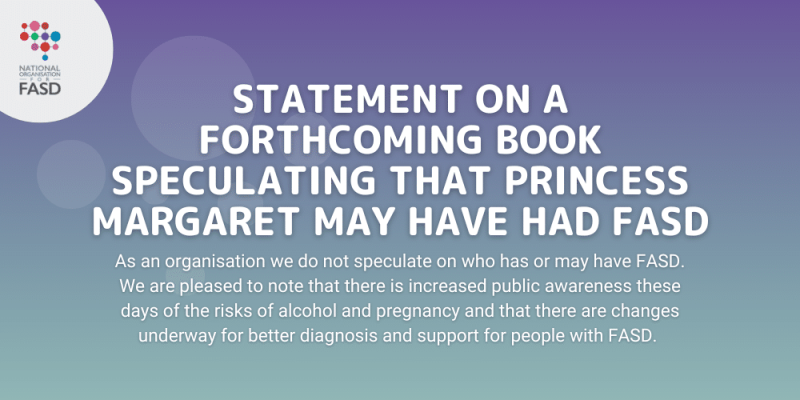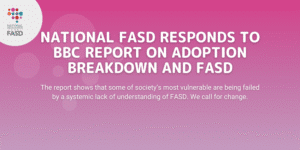Our statement
For immediate release
30 July 2025
An article in The Telegraph, 30 July 2025 focuses on a new book by Meryle Secrest that raises questions about whether or not Princess Margeret may have had Fetal Alcohol Spectrum Disorder. The book, Princess Margaret and the Curse: An Inquiry into a Royal Life, is due for release on 9 September, international FASD awareness day.
Sandra Butcher, National FASD’s chief executive said, “While we as an organisation do not speculate on who may or may not have FASD, we are pleased to note that there is increased public awareness these days of the risks of alcohol and pregnancy and that there are changes underway for better diagnosis and support for people with FASD. The UK Chief Medical Officers guidelines only changed in 2016 to say that the safest approach was not to drink alcohol at all in pregnancy. In 1930 there was no advice on the risks associated with prenatal alcohol exposure. It is now known that there is no proven safe amount of alcohol in pregnancy. We note that Meghan, now the Duchess of Sussex, made a point of going alcohol-free in her pregnancy and Prince Harry reportedly joined her in that and that was a welcome signal from people with considerable influence.”
Jan Griffin said, “As a birth parent of someone with FASD I welcome this article, without commenting on the book’s legitimacy. It can only build awareness of this hidden disability. If the book brings attention to birth mothers and the lack of awareness of the risks posed by alcohol during pregnancy, it can only shine a light on the fact that FASD does not discriminate between class. It’s important that birth mothers and people with FASD do not feel judged and are able to seek support. The preconceived idea that only alcoholics give birth to children with FASD is simply not true. This stigma is more than likely the cause preventing birth parents who are concerned about prenatal alcohol exposure from coming forward and seeking help and support for their child.”
Prenatal alcohol exposure can affect the developing brain and body. FASD is a neurodevelopment condition that affects 2-4% of the population and is more prevalent than autism but is often undiagnosed or misdiagnosed. It can affect memory, impulsivity, and abstract thinking. People with FASD are often seen as being naughty and mischievous whereas this is due to their organic brain damage. In the UK the diagnostic term is FASD (Fetal Alcohol Spectrum Disorder). FAS (Fetal Alcohol Syndrome) is an old term that relates to less than 10% of those with certain facial features.
Georgia Roberts, a 23-year old with FASD said, “People with FASD aren’t incapable, we are capable. Its normally because people hold us back because they don’t understand, so we fail. We need to be supported and empowered to know our strengths by people who are aware of FASD and understand it so we can live our best lives.”
Butcher said, “We are concerned that any reporting about this book must sensitively reflect real lived experience and the latest science. FASD should not be described as ‘a curse’ and we should avoid saying those living with FASD ‘suffer’. We believe people with FASD can, and do, live fulfilling, productive and creative lives with the appropriate support. This is the focus of the work that The National Organisation for FASD does. Government needs to act. It is too often a battle for diagnosis and support. Government should institute an FASD Prevention and Response fund equivalent to 0.2% of the alcohol duty so national policies can be implemented, awareness campaigns can inform the public and those who experience alcohol harm before their first breath can get the support they deserve.”
Ends
Media inquiries: [email protected] • 07920 747 560 • Case studies available
Background information
“FASD results when prenatal alcohol exposure affects the developing brain and body. FASD is a spectrum. Each person with FASD is affected differently. While more than 400 conditions can co-occur, FASD is at its core a lifelong neurodevelopmental condition. All people with FASD have many strengths. Early diagnosis and appropriate support are essential, especially for executive functioning.” (Source: FASD: Preferred UK Language Guide, Seashell Trust/National FASD, 2020)
“There is no known safe level of alcohol consumption during pregnancy. NICE, Fetal Alcohol Spectrum Disorder Quality Standard 204(2022).
“If you are pregnant or think you could become pregnant, the safest approach is not to drink alcohol at all, to keep risks to your baby to a minimum.” Chief Medical Officers guidance(2016)
“There is no known safe level of alcohol consumption in pregnancy. Even low to moderate levels of PAE [prenatal alcohol exposure] can negatively impact a fetus and these adverse consequences can persist into adulthood.” SIGN 156, “Children and Young People Prenatally Exposed to Alcohol” (2019)
Over 40% of womenin the UK use alcohol during pregnancy, making the UK the 4th highest rate of alcohol exposed pregnancies in the world. (This is higher than the rate of tobacco-exposed pregnancies.)
A gold-standard studyby the University of Salford showed that 2-4% have FASD. That’s a higher rate than autism. Most people with FASD are unrecognised, undiagnosed or misdiagnosed.
“The government recognises the importance of FASD.” Department of Health and Social Care, “FASD Health Needs Assessment for England” (2021)
“There is no ‘mild’ FASD.” “FASD Health Needs Assessment for England” (2021)
“Prenatal alcohol exposure should be actively considered as a possible underlying cause for neurodevelopmental delay.” SIGN 156, “Children and Young People Prenatally Exposed to Alcohol” (2019)
“The needs identified for this population group focus on: a lack of robust prevalence estimates in England; the importance of multi-sector working to support individuals through the life course; better training and awareness for health professionals; better organisation of services to improve accessibility; a need to develop innovative approaches to support those living with the condition.” “FASD Health Needs Assessment for England” (2021)
NICE Quality Standard 204 (2022) identifies areas for improving quality of care regarding: advice on avoiding alcohol in pregnancy; prenatal alcohol exposure; referral for assessment; neurodevelopmental assessment; and management plan. Unlike guidance, local areas in England and Wales have to ‘have regard’ for Quality Standards and report on progress in improving care.
“No specific public health messaging on fetal alcohol spectrum disorder (FASD) has been undertaken in the last five years.” Maggie Throup, Parliamentary Under-Secretary for Health and Social Care, Hansard, 21 Sept 2021 (Note this coincides with the 2016 release of the CMOs’ guidance, there has still not been any national public health campaign about alcohol-exposed pregnancies.)
National FASD has co-produced FASD: A Preferred UK Language Guide–we encourage anyone reporting on this issue to please avoid negative phrasing and to note there are new diagnostic terms in the UK. Fetal Alcohol Syndrome is no longer used, it is now called FASD with sentinel facial features.
National FASD has done research that shows the majority of NHS health boards, ICBs and Trusts are not taking action on NICE Quality Standard 204. Not Commissioned: Systemic confusion in NHS services for alcohol, pregnancy and FASD
National FASD has also produced a report that highlights best practice and actions that can be taken, even in the context of tight budgets. The Time is Now: The National Perspective on Ramping up FASD Prevention, Diagnosis and Support Services



